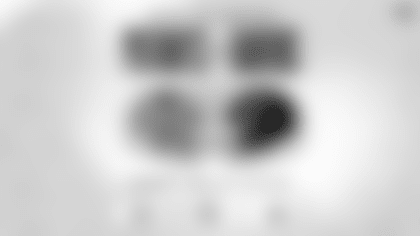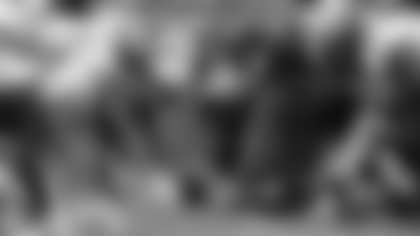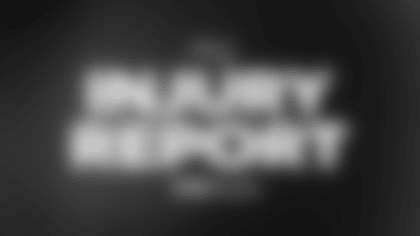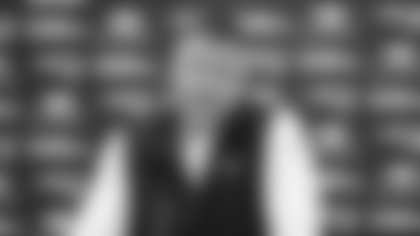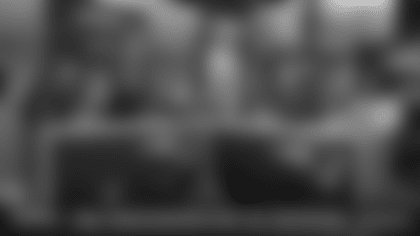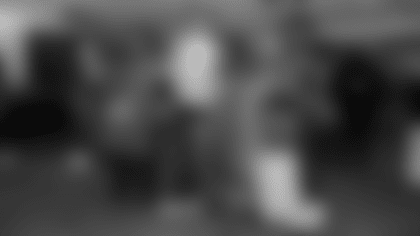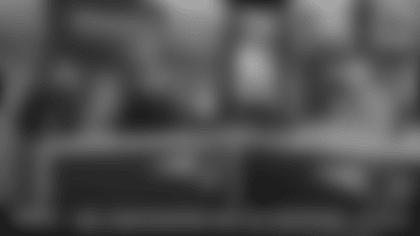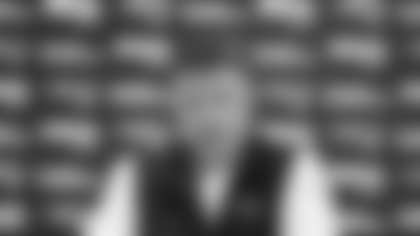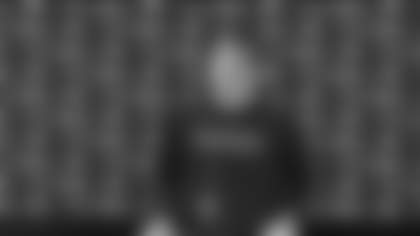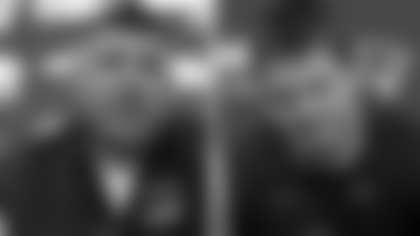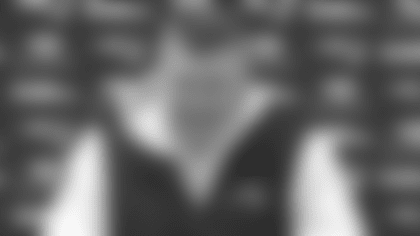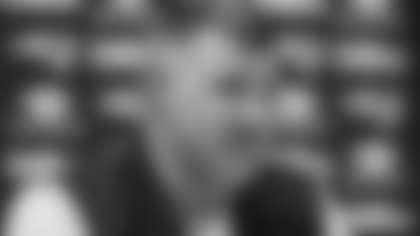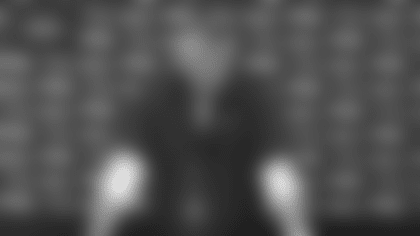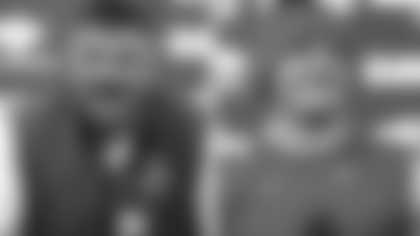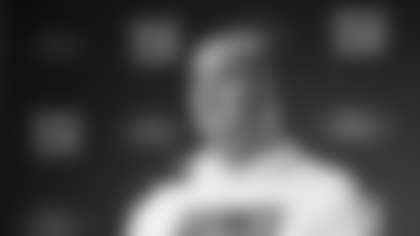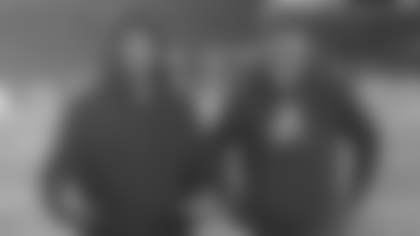PATRIOTS HEAD COACH JEROD MAYO
PRESS CONFERENCE
August 23, 2024
JM: We're excited to be out here. We had a good week of preparation. This was really the first opportunity that we've had to really go through how it's going to be during the regular season: a game week, as far as preparation, as far as running cards out here with the scout team and really just getting ready for an opposing team. So, it's been a great week. Secondly, I heard this is your last day that you guys would be able to be out here all practice. I'm going to miss you guys during practice. But I appreciate all you guys and the cooperation. Hopefully, it's been smooth for you guys.
Q: Looking at the third preseason game, it's important for a lot of players that are trying to fulfill a dream and what have you. How many roster spots in your mind do you still have open going into this one?
JM: That's a tough question. This game, we say it doesn't count, but it matters. I think there are still a few positions where it's a battle. We've been talking about competition all year, and that's still my message right now.
Q: How much of a learning curve has it been for everyone, just basically bringing in the game plan aspect of things, just working on the install?
JM: I wouldn't say it's so much of a learning curve. I would say initially, we were focused on N.E.P. [New England Patriots]. Whatever phase of the game we're talking about, it was all about us. Now, you start to focus on another team and their personnel. Once again, we don't know who's going to play over there, but it doesn't matter. It's more of the exercise of going through who are their go-to players, offensively, defensively and special teams, and how do we stop them? These are the things that we need to be careful of, and these are things we want to try to exploit. So, most teams talk about the post-mortem. They end up going and seeing what happened in the game. To me, it's about the pre-mortem. How do we prevent ourselves from losing the game? You can't win until you stop from losing.
Q: For some guys who might be perceived to be on the roster bubble who may be kind of playing for their lives on Sunday night, how do you kind of preface conversations with them in terms of maybe tampering down that anxiety, some concern, whatever the case is?
JM: That's right. After you hit someone on the first snap, it just gets right back to football. I think sometimes it's overblown as far as the anxiety and things. Look, anxiety is natural. It's normal. We talk about that every week. But after you go out there and play a couple of plays, it's just like when you were 6 years old out on the practice field. So, I think the guys are ready to go. They understand it's professional football. There are more people in the locker room than there are jobs. They've known that since day one.
Q: Coach, on the offensive line yesterday, you had Mike [Onwenu] at right tackle, Layden [Robinson] at right guard. What did you see from that group? Is that a grouping we're going to see as we go on?
JM: I would say it was encouraging. It was encouraging to see that. Anytime you can sandwich a rookie between two veteran players, that's always going to be a benefit for the player and also the team. We're still trying to figure out that combination, but I feel like we're getting pretty close.
Q: You talk a lot about developing men in addition to players. When you think about some of the motivational messages that you've decided to highlight, why is one of them about not taking what someone says, that you wouldn't solicit their advice? Why is that one that came up?
JM: To me, I'm not going to take financial services advice from a barber. I'm just not going to do it. It's nothing against a barber because vice versa: I'm not going to take any type of haircut advice from a financial advisor. Look, I think it's important for you to – the people that I take advice from are people that if I had to switch lives with that person right now, it wouldn't be a big problem. So, that's kind of how I look at it.
Q: For players, I'm thinking, you've played. You've been around the block. You're a father. You have more life experience, but for the players that you're sending this message to, they're younger. What is it about the world we live in, or whatever, that made that happen?
JM: I think naturally, from a staffing perspective, whether you're talking about [Matthew] Slater, myself or [Dont'a] Hightower, I think all of those guys have increased credibility, especially with the young guys. So, they're always going to ask them questions, not only about X's and O's, but how they deal with situations off the field. It's on me to make sure that our staff is on the same page on how we want to get that messaging across to the young guys. I hope that answers it. That is a good question, and it's a longer answer. I could go for about 30 minutes on that question.
Q: Coach, this team had a long streak of having undrafted free agents make the roster. How important is it for the organization to restart that streak and have those kinds of players know that this is a team where they have a shot?
JM: It's huge. I always tell those guys they all were on teams in college where a five-star would come in or a four-star would come in and everyone's like, 'Ooh,' but they're trash. So, you have that one-star player that actually makes the team. I think it's important, and once again, going back to competition and going back to [how] my job is to put the best player on the field no matter where you drafted them. So, that's kind of how I think about it.
Q: Speaking of the undrafted free agents, someone who we saw have his hand in two plays, one that was intercepted, one that was almost [intercepted] was Dell Pettus yesterday. What's it like seeing someone like that come in here and have this kind of impact on the field?
JM: He's done a fantastic job. There's been a lot of conversation around him, but he's done a fantastic job up until this point. But it is important that those guys go out here and realize, 'I can play at this level.' There's always this imposter syndrome where, 'Am I good enough, or am I not good enough?' For a guy like Dell Pettus, for example, to go out and make those plays just continues to boost his confidence.
Q: What about someone like David Wallis as well? With the punt returns, we've seen him have a decent camp.
JM: Yeah, he's had a decent camp. I would say he has definitely gotten better. He's an explosive player. We have to find a role for him.
Q: The rookie's coming to the end of their first NFL training camp. How have they done as a group when it comes to responding to some of the challenges that have been put in front of them?
JM: I would say, as a whole, they've done well. Whether we're talking about the slip-and-slide, or we're talking about running up the hill after a two-and-a-half-hour practice, I think those guys have responded well. Now, the game is always going to be different, and that's what I'm trying to really focus on this week: the game and then an away game for those guys. This will be their first opportunity as a young player to go on the road and get their routine kind of tightened down because the first game of the season will be on the road.
Q: You say every player is going to play. Are we talking one possession for the first team?
JM: No, we're going to play. Jacoby [Brissett] is going to start the game off. Drake [Maye] will play as well. Joe [Milton II] will play as well. Now, you guys can sleep. Bailey [Zappe] will play. We do have some players dealing with small things that probably won't play and get ready for the regular season – some of our proven players.
Q: Can I stick on the quarterback topic for a second? I'm curious how you value things when it comes to that position. Alex [Van Pelt] was here with us yesterday talking about how Jacoby has a lot of tools at this point in terms of diagnosing defenses, that Drake probably doesn't just based on experience. Is that more valuable than the ability to make some plays physically that Drake might be able to make that other quarterbacks might not be able to? How do you weigh those two things, and what's more valuable to you?
JM: To me, the top two things are mental toughness and competitiveness. Those are two qualities that I really look at with quarterbacks. I can't sit here and tell you, unless it's like a Philip Rivers release, where, 'Man, that release is kind of weird.' I don't get into the technical stuff. For me, evaluating a quarterback or any other player, but especially the quarterback, they have to be mentally tough, and they have to be able to bounce back from all the adversity that they're bound to see.
Q: What are your thoughts on that going into camp and coming out of camp with Drake [Maye]? Because you knew Jacoby had those two things.
JM: If you guys remember early on, he [Drake Maye] would throw interceptions and he [Drake Maye] would get so down on himself. I would say now, as we exit camp, he's [Drake Maye] done a lot better job being able to pull the nose up on the plane when it seems like it's going down. I think that's an important quality.
Q: You seem like you've been in a lot of different places with positional players as you go about your day. Is that something you wanted to do, or has it just naturally evolved here?
JM: No, that's something that I wanted to do. I talk about it all the time. We brought in 17 new coaches. I have to have belief in my coaching staff to go out there and really get the things done. We meet all the time inside the building, and we're all on the same page. One thing I would say from my perspective, the most important thing is fundamentals. The X's and O's, no matter what team you're talking about, it's really the same thing they've been running since college. It's about linking that communication. For me, when you look at a game that you just lost, a close game for example, you can always point back to fundamentals, whether they're good or they're bad. Tackling, running, catching, throwing the ball. All the basic things that young kids are learning now. Those things still exist at this level.
Q: We saw a glimpse about what regular season practice is going to look like. Obviously, it's a little different with 90 guys out there. In the past when we've talked to veteran players, they've been surprised that only starters practice. A lot of other guys are on the scout team. Are you going to continue that or is there going to be a little bit more competition?
JM: I think it's always competition. I'll take you back to a story when I was a player here early on. The starters would run the first three scout team reps. I think it's important that the first team offense gets to see what the first team defense is doing. Then you get the show team players. Our philosophy – when I say "our", I'm talking about Eliot [Wolf] and myself – the way we look at the practice squad is a development [unit]. It's not a, 'Alright, this guy's just out here to take snaps.' We're going to depend on these guys, whether it's Week 1 or the end of the season. We look to develop these guys, so it's definitely important.
Q: Jerod, when we were talking to AVP [Alex Van Pelt] yesterday, he just talked about dissecting defenses. How different, from a defensive perspective, is preseason defense compared to regular season defense?
JM: Yeah, it's definitely different. I would say we have a very versatile and complex defense that he's going against all training camp. He has seen a lot of that stuff. Now, there are game plan things that you'll see going into the game, but at the same time, we'll pair down the playbook, so it balances itself out.


